Committee Members
Blair Beavers
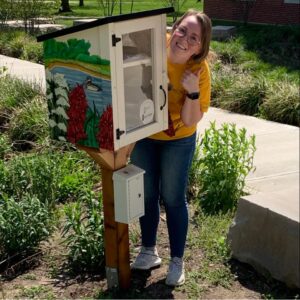 Blair Beavers is the Education Coordinator and Assistant Director for the Johnson County Soil & Water Conservation District. She graduated from Indiana University’s School of Public & Environmental Affairs with a degree in Environmental Management in 2015. Immediately after college Blair worked for Bloomington Parks & Recreation as a Natural Resource Education Specialist, and began working at Johnson County Soil & Water in 2017. The district became an Indiana Master Naturalist host for the Franklin area in 2018 and has continued to hold the class annually. In addition to hosting IMN, she is the chair of the Johnson County Native Plant Partnership, which focuses on reducing the impacts of invasive species and promoting the use of native plant species in landscaping. To further that mission, the district was funded by the Indiana Native Plant Society’s Biodiversity Grant in 2021 to begin the Little Native Seed Library Trail. The trail uses Little Free Library boxes to educate on native landscaping, give away native seed packets, and showcases seven different native plant habitats across Johnson County. The trail is open from May 1st to October 31st each year.
Blair Beavers is the Education Coordinator and Assistant Director for the Johnson County Soil & Water Conservation District. She graduated from Indiana University’s School of Public & Environmental Affairs with a degree in Environmental Management in 2015. Immediately after college Blair worked for Bloomington Parks & Recreation as a Natural Resource Education Specialist, and began working at Johnson County Soil & Water in 2017. The district became an Indiana Master Naturalist host for the Franklin area in 2018 and has continued to hold the class annually. In addition to hosting IMN, she is the chair of the Johnson County Native Plant Partnership, which focuses on reducing the impacts of invasive species and promoting the use of native plant species in landscaping. To further that mission, the district was funded by the Indiana Native Plant Society’s Biodiversity Grant in 2021 to begin the Little Native Seed Library Trail. The trail uses Little Free Library boxes to educate on native landscaping, give away native seed packets, and showcases seven different native plant habitats across Johnson County. The trail is open from May 1st to October 31st each year.
Bill Daniels
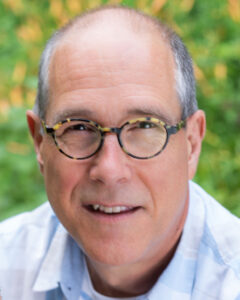 Bill retired in 2019 from a work-life spent primarily in horticulture and environmental, health and safety, and now spends much of his time procuring, processing and propagating native plant seeds. In addition to being the Indiana Native Seed Communities Program Leader, he helps with Monroe County-Identify and Reduce Invasive Species (MC-IRIS) Fall Native Plant Sale and Sycamore Land Trust’s Native Plant Nursery. He is also Indiana Native Plant Society’s South Central chapter’s VP, and an Advanced Master Gardener. Other areas of interest include vocal music and the effects of our food choices on biodiversity loss.
Bill retired in 2019 from a work-life spent primarily in horticulture and environmental, health and safety, and now spends much of his time procuring, processing and propagating native plant seeds. In addition to being the Indiana Native Seed Communities Program Leader, he helps with Monroe County-Identify and Reduce Invasive Species (MC-IRIS) Fall Native Plant Sale and Sycamore Land Trust’s Native Plant Nursery. He is also Indiana Native Plant Society’s South Central chapter’s VP, and an Advanced Master Gardener. Other areas of interest include vocal music and the effects of our food choices on biodiversity loss.
Gillian Harris
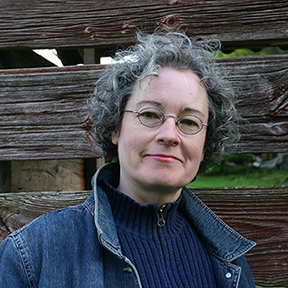 An Indiana Master Naturalist, Gillian has spent most of her career fusing her love of the natural world with art and writing.
An Indiana Master Naturalist, Gillian has spent most of her career fusing her love of the natural world with art and writing.
After obtaining a BA in English at IU, Gillian studied botany at the University of Michigan and U-M’s Matthaei Botanical Gardens. She also studied illustration at U-M and worked with a consortium of illustrators, Michigan Science Art.
Back in Bloomington, she illustrated two garden books and was editor of IU Press’s Indiana Natural Science Series. She was Artist of the Year for the 2004 Great Smoky Mountains Wildflower Pilgrimage, and participated in several juried exhibitions focusing on native plants with the American Botanical Artist Society. Gillian was artist-in-residence at T.C. Steele State Historic Site in Brown County and at the Indiana Dunes National Lakeshore and for several years she wrote a column about landscaping with native plants for the Bloomington Herald-Times. She is on the planning committee for the annual Brown County Wildflower Foray and volunteers with Sycamore Land Trust.
Gillian’s most recent projects include a series of technical pen-and-ink illustrations of African lobelias, and pencil and watercolor illustrations for the children’s book Wake Up Woods, by Mike Homoya and Shane Gibson (sponsored by INPS). As a board member of the South Central Chapter of INPS, she publishes the monthly chapter newsletter.
Ray Major
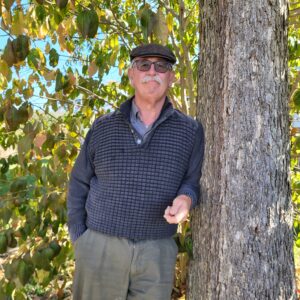 Ray Major was born in 1949 and was raised in Bath Township in Franklin County, Indiana.
Ray Major was born in 1949 and was raised in Bath Township in Franklin County, Indiana.
His family was in the livestock business, where he grew up tending feeder calves and pigs. He has also gardened and grew trees since childhood.
Ray earned a BS degree in Wildlife Biology from Purdue University in 1974. Much of his life’s work has been as a tree farmer on his own place in Clark County, as well as timber management and hardwood plantation management work in cooperation with other tree farmers in Southern Indiana.
In retirement, Ray administers a Facebook group, Trees From Seed, which serves as a resource and ‘advice column’ for growing, protecting and caring for native woody plants by direct seeding. This includes everything from growing a single shade tree in the front yard from an acorn to reforesting abandoned crop fields, lawns and idle land by direct seeding.
Important goals of Trees From Seed include:
- Making shade trees possible and affordable for the poor, the disabled, the elderly and children, i.e. those who lack the money or the physical strength to buy and transplant commercial nursery stock.
- To develop affordable techniques to convert forests of Callery pear, non native mulberry, Ailanthus and bush honeysuckle to native oak-hickory or mixed native hardwood forests.
- To encourage the conversion of idle land and excessive lawns to forestland. As regular mowing of large areas becomes increasingly expensive, conversion of land to forest (and prairie, on soils and sites that are suitable), is a responsible way to properly care for the land with far less expense.
- To encourage reforestation for carbon sequestration, local climate moderation, soil stabilization, water quality improvement and flood mitigation.
Greg Monzel
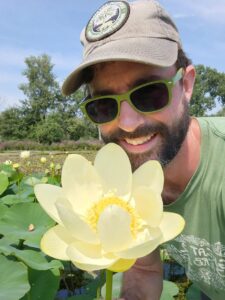 Greg Monzel is a community herbalist and foraging instructor with a passion for connecting people and plants. He is the founder of Persimmon Herb School on the southeast side of Indianapolis. Greg is a full-time field botany student at Ball State University with a special interest in conservation and restoration of culturally important plant species, such as wild rice and American lotus. He also serves as INPS Central Chapter’s president.
Greg Monzel is a community herbalist and foraging instructor with a passion for connecting people and plants. He is the founder of Persimmon Herb School on the southeast side of Indianapolis. Greg is a full-time field botany student at Ball State University with a special interest in conservation and restoration of culturally important plant species, such as wild rice and American lotus. He also serves as INPS Central Chapter’s president.
Maraiah Russell
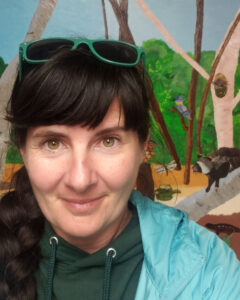 Maraiah Russell is the Preserves and Volunteer Manager at Little River Wetlands Project. RWP is a nonprofit land trust founded in 1990 with the goal of restoring and preserving wetlands in he watershed of the Little River, a headwater tributary of the Wabash River. Its primary project area encompasses 25,000 acres of land once known as the Great Marsh in Allen and Huntington Counties. Maraiah has been working with LRWP for 4 years, and currently oversees the growing of native plants from seed for restoration and sharing with the community. She is an Indiana Master Naturalist, a long-time member of INPS, and a native plant enthusiast.
Maraiah Russell is the Preserves and Volunteer Manager at Little River Wetlands Project. RWP is a nonprofit land trust founded in 1990 with the goal of restoring and preserving wetlands in he watershed of the Little River, a headwater tributary of the Wabash River. Its primary project area encompasses 25,000 acres of land once known as the Great Marsh in Allen and Huntington Counties. Maraiah has been working with LRWP for 4 years, and currently oversees the growing of native plants from seed for restoration and sharing with the community. She is an Indiana Master Naturalist, a long-time member of INPS, and a native plant enthusiast.
Mark Sheehan
 Inspired by his mother’s enthusiasm for wild birds and spring wildflowers, Mark became a serious student naturalist in 1969. He received a bachelor’s degree in Botany from Indiana University in 1970, a master’s degree in Plant Sciences in 1972, and a Ph.D. in Biology in 1979.
Inspired by his mother’s enthusiasm for wild birds and spring wildflowers, Mark became a serious student naturalist in 1969. He received a bachelor’s degree in Botany from Indiana University in 1970, a master’s degree in Plant Sciences in 1972, and a Ph.D. in Biology in 1979.
After a 30-year career as an information technology administrator in higher education, Mark retired and returned to natural history, working in part-time, forest-technician jobs in IU’s Department of Biology and The O’Neill School of Public and Environmental Affairs. As an adjunct instructor, he has developed and taught summer plant-identification courses for both of those academic units. He has also taught plant identification in the Indiana Master Naturalist Program and the Colorado Native Plant Master Program.
Mark has been a member of the Indiana Native Plant Society since 2012. He is a past member of the Colorado Native Plant Society and a current member of the Montana Native Plant Society, Valley of the Flowers Chapter. In 2018, with assistance and guidance from the INPS Board of Directors, Mark initiated the INPS Annual Conference seed swap. He and his family live in Bloomington.
Dolly Foster
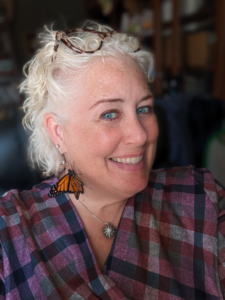 Dolly has been a Horticulturist for 24 years, a Certified Arborist since 2008, and holds a Masters in Agriculture from the University of Illinois. She grows and sells native plants and pollinator plants from her home by appointment. For the past 24 years, Dolly has been presenting lectures on many gardening topics. She spent two years as adjunct faculty at Joliet Junior College Agriculture/ Horticulture Department and 18 years in the Parks and Recreation industry as staff horticulturist for two park districts. She has been butterfly gardening from the very beginning of her gardening career. Her passion has led her to raising monarch and swallowtail butterflies for 16 years. Her garden at home has been a Monarch Waystation since 2011. Dolly also runs a micro plant nursery at her home selling plants exclusively for pollinators June-October.
Dolly has been a Horticulturist for 24 years, a Certified Arborist since 2008, and holds a Masters in Agriculture from the University of Illinois. She grows and sells native plants and pollinator plants from her home by appointment. For the past 24 years, Dolly has been presenting lectures on many gardening topics. She spent two years as adjunct faculty at Joliet Junior College Agriculture/ Horticulture Department and 18 years in the Parks and Recreation industry as staff horticulturist for two park districts. She has been butterfly gardening from the very beginning of her gardening career. Her passion has led her to raising monarch and swallowtail butterflies for 16 years. Her garden at home has been a Monarch Waystation since 2011. Dolly also runs a micro plant nursery at her home selling plants exclusively for pollinators June-October.
